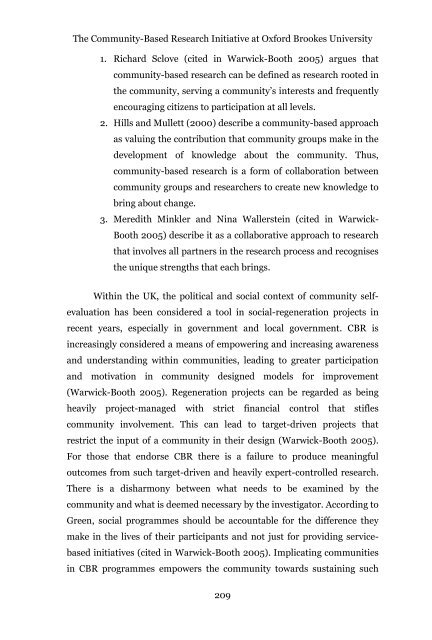The Scholarship of Engagement for Politics: - Higher Education ...
The Scholarship of Engagement for Politics: - Higher Education ...
The Scholarship of Engagement for Politics: - Higher Education ...
You also want an ePaper? Increase the reach of your titles
YUMPU automatically turns print PDFs into web optimized ePapers that Google loves.
<strong>The</strong> Community-Based Research Initiative at Ox<strong>for</strong>d Brookes University<br />
1. Richard Sclove (cited in Warwick-Booth 2005) argues that<br />
community-based research can be defined as research rooted in<br />
the community, serving a community’s interests and frequently<br />
encouraging citizens to participation at all levels.<br />
2. Hills and Mullett (2000) describe a community-based approach<br />
as valuing the contribution that community groups make in the<br />
development <strong>of</strong> knowledge about the community. Thus,<br />
community-based research is a <strong>for</strong>m <strong>of</strong> collaboration between<br />
community groups and researchers to create new knowledge to<br />
bring about change.<br />
3. Meredith Minkler and Nina Wallerstein (cited in Warwick-<br />
Booth 2005) describe it as a collaborative approach to research<br />
that involves all partners in the research process and recognises<br />
the unique strengths that each brings.<br />
Within the UK, the political and social context <strong>of</strong> community selfevaluation<br />
has been considered a tool in social-regeneration projects in<br />
recent years, especially in government and local government. CBR is<br />
increasingly considered a means <strong>of</strong> empowering and increasing awareness<br />
and understanding within communities, leading to greater participation<br />
and motivation in community designed models <strong>for</strong> improvement<br />
(Warwick-Booth 2005). Regeneration projects can be regarded as being<br />
heavily project-managed with strict financial control that stifles<br />
community involvement. This can lead to target-driven projects that<br />
restrict the input <strong>of</strong> a community in their design (Warwick-Booth 2005).<br />
For those that endorse CBR there is a failure to produce meaningful<br />
outcomes from such target-driven and heavily expert-controlled research.<br />
<strong>The</strong>re is a disharmony between what needs to be examined by the<br />
community and what is deemed necessary by the investigator. According to<br />
Green, social programmes should be accountable <strong>for</strong> the difference they<br />
make in the lives <strong>of</strong> their participants and not just <strong>for</strong> providing servicebased<br />
initiatives (cited in Warwick-Booth 2005). Implicating communities<br />
in CBR programmes empowers the community towards sustaining such<br />
209
















